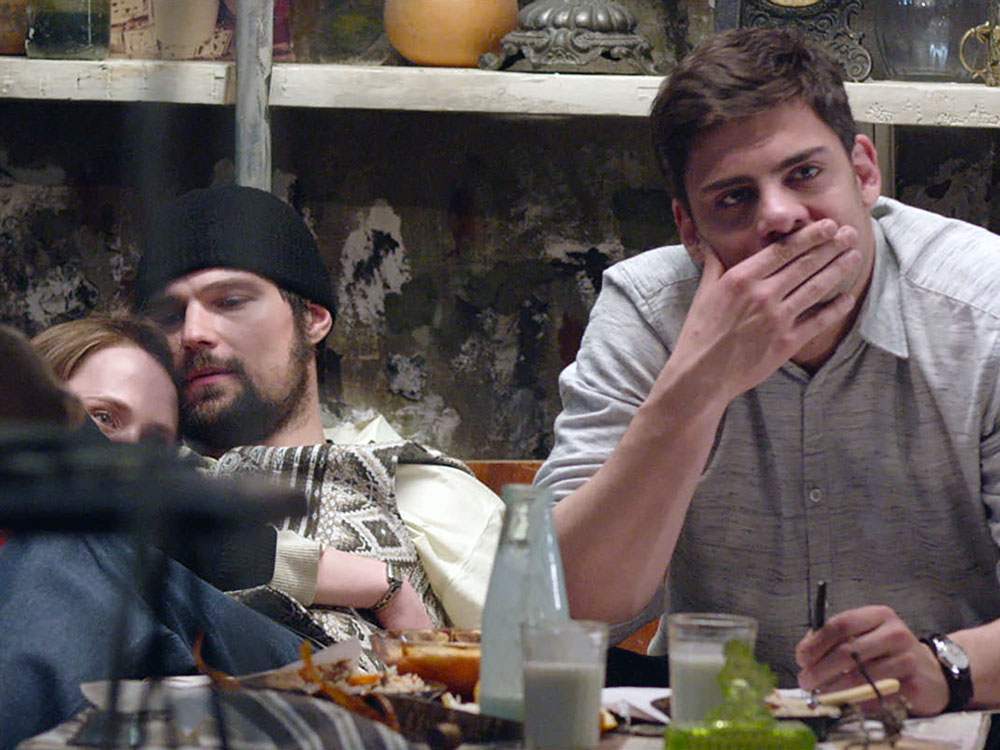ICA is closed from the 30 May – 3 June inclusive.
Sarah Meyohas, Cloud of Petals (Narrated Trailer), 2017, 3 min. 45 sec. Image: Courtesy the artist and Marianne Boesky Gallery, New York and Aspen
Cinema 3
Stream all films and moving image works from the Frieze Film × ICA programme, available worldwide from 10 October to 29 October.
Frieze and the ICA have curated a programme of artists’ film and moving image, coinciding with Frieze London’s 20th Anniversary.
Artists:
Elisa Giardina PapaNoémie Goudal
Kiluanji Kia Henda
donna Kukama
Sarah Meyohas
Hannah Quinlan & Rosie Hastings
Sin Wai Kin
Jordan Strafer
Lewis Teague Wright
Alberta Whittle
In this screening programme of recent artists’ film and moving image, viewers embark on a journey through a series of visual narratives that collectively weave a network of contemporary and historical themes. From the intimate exploration of human emotions and societal dynamics to the broader strokes of anthropological truths and political landscapes, the audience is invited to immerse themselves in a diverse but harmonious convergence of perspectives. This programme transcends genre boundaries, fostering a critical dialogue that encourages reflection and understanding, while showcasing the transformative power of artists’ film and moving image as a medium that blurs the lines between reality and speculative fiction, and between the individual and the collective. A vivid illustration of the innovative and reflective spirit of artists’ film and moving image, the programme serves as a mirror reflecting the complex and ever-changing narratives of our time.
A panel of curators and researchers, including ICA’s Curator of Artists’ Film and Moving Image, Steven Cairns, independent curator and writer Greg de Cuir Jr., and Róisín Tapponi, founder of Shasha Movies, selected the 2023 Frieze X ICA Artists’ Film and Moving Image Programme.
Programme

“U Scantu”: A Disorderly Tale, Elisa Giardina Papa, 2022, 12 min. 12 sec.
A group of teenagers representing the donne di fora traverse a utopian city, their journey nuanced with layers of poetic texts and motifs borrowed from a 19th century collection of Sicilian fairy tales.

Inhale, Exhale, Noémie Goudal, 2021, 8 min. 16 sec.
A sober exploration into the anthropological narratives of the last ice age, scrutinising the plausible pathways of human migration across the then-frozen Bering Sea.

Phantom Pain – A Letter to Henry Kissinger, Kiluanji Kia Henda, 2020, 8 min. 33 sec.
A personal and poignant narrative, framed as a video letter addressed to the former U.S. Secretary of State, Henry Kissinger. Set against the backdrop of the street where Henda spent his formative years, the film serves as a visual testament to the lingering scars of the Angolan Civil War (1975 – 2002).

The Swing (after After Fragonard), donna Kukama, 2009, 4 min. 56 sec.
A reimagination of Jean-Honoré Fragonard’s 1766 painting of the same name, a beacon of Ancien Régime extravagance on the cusp of the French Revolution, transplanting it into Johannesburg’s bustling Mai-Mai Market.

Cloud of Petals (Narrated Trailer), Sarah Meyohas, 2017, 3 min. 45 sec.
A cinematic exploration of the intricate relationships woven between beauty, nature, digital evolution and exchange. Set in the former Bell Labs, a space that of scientific innovation and artistic ingenuity, sixteen workers are engrossed in the act of selecting and archiving 100,000 petals from 10,000 roses, creating a digital garden in the cloud.

Something for the Boys, Hannah Quinlan & Rosie Hastings, 2018, 16 min. 34 sec.
A vivid portrait of Blackpool, a historic seaside resort grappling with the strains of austerity and shifting identities. The film delves deep into the vibrant yet juxtaposed worlds of Blackpool: the antiquated nostalgia of a Victorian holiday retreat and its exuberant gay scene, which embodies both the golden era of musical theatre and echoes of the harrowing AIDS years.

Dreaming the End, Sin Wai Kin, 2023, 21 min. 6 sec.
A liminal space where time, references and locales intermingle, bringing forth the familiar and the uncanny in a tapestry of dream-like narratives and enigmatic characters. This project borrows and reshapes elements from thriller, noir, and fantasy, distorting the frameworks of narrative cinema.

SOS, Jordan Strafer, 2021, 11 min. 8 sec.
A homage to German Expressionism, the piece revives the era’s stark narratives and new filmmaking techniques. Strafer orchestrates a tableau with dolls embodying life’s fragility amidst cyclices of night and day. Through the manipulation of these figures by silicone hands, Strafer carves an allegory of power dynamics and existential futility. Strafer, echoing traditions of meta-cinema, showcases these directorial interventions, turning the film into a reflective discourse on the craft itself.

TOYOTA00, Lewis Teague Wright, 2018, 4 min. 57 sec.
An unflinching meditation on female ageing, lesbian sexuality and breast cancer in a culture that glorifies youth and heterosexual romance.

A Black footprint is a beautiful thing, Alberta Whittle, 2021, 11 min. 30 sec.
A nuanced exploration of the shipworm. Whittle casts this seemingly insignificant marine organism as a subversive figure in history, conceptualising it as a decolonial agent that inadvertently thwarted the progress of European imperialism by consuming the wooden infrastructures of ships deployed in the colonisation of the Caribbean.

“U Scantu”: A Disorderly Tale, Elisa Giardina Papa, 2022, 12 min. 12 sec.
A group of teenagers representing the donne di fora traverse a utopian city, their journey nuanced with layers of poetic texts and motifs borrowed from a 19th century collection of Sicilian fairy tales.

Inhale, Exhale, Noémie Goudal, 2021, 8 min. 16 sec.
A sober exploration into the anthropological narratives of the last ice age, scrutinising the plausible pathways of human migration across the then-frozen Bering Sea.

Phantom Pain – A Letter to Henry Kissinger, Kiluanji Kia Henda, 2020, 8 min. 33 sec.
A personal and poignant narrative, framed as a video letter addressed to the former U.S. Secretary of State, Henry Kissinger. Set against the backdrop of the street where Henda spent his formative years, the film serves as a visual testament to the lingering scars of the Angolan Civil War (1975 – 2002).

The Swing (after After Fragonard), donna Kukama, 2009, 4 min. 56 sec.
A reimagination of Jean-Honoré Fragonard’s 1766 painting of the same name, a beacon of Ancien Régime extravagance on the cusp of the French Revolution, transplanting it into Johannesburg’s bustling Mai-Mai Market.

Cloud of Petals (Narrated Trailer), Sarah Meyohas, 2017, 3 min. 45 sec.
A cinematic exploration of the intricate relationships woven between beauty, nature, digital evolution and exchange. Set in the former Bell Labs, a space that of scientific innovation and artistic ingenuity, sixteen workers are engrossed in the act of selecting and archiving 100,000 petals from 10,000 roses, creating a digital garden in the cloud.

Something for the Boys, Hannah Quinlan & Rosie Hastings, 2018, 16 min. 34 sec.
A vivid portrait of Blackpool, a historic seaside resort grappling with the strains of austerity and shifting identities. The film delves deep into the vibrant yet juxtaposed worlds of Blackpool: the antiquated nostalgia of a Victorian holiday retreat and its exuberant gay scene, which embodies both the golden era of musical theatre and echoes of the harrowing AIDS years.

Dreaming the End, Sin Wai Kin, 2023, 21 min. 6 sec.
A liminal space where time, references and locales intermingle, bringing forth the familiar and the uncanny in a tapestry of dream-like narratives and enigmatic characters. This project borrows and reshapes elements from thriller, noir, and fantasy, distorting the frameworks of narrative cinema.

SOS, Jordan Strafer, 2021, 11 min. 8 sec.
A homage to German Expressionism, the piece revives the era’s stark narratives and new filmmaking techniques. Strafer orchestrates a tableau with dolls embodying life’s fragility amidst cyclices of night and day. Through the manipulation of these figures by silicone hands, Strafer carves an allegory of power dynamics and existential futility. Strafer, echoing traditions of meta-cinema, showcases these directorial interventions, turning the film into a reflective discourse on the craft itself.

TOYOTA00, Lewis Teague Wright, 2018, 4 min. 57 sec.
An unflinching meditation on female ageing, lesbian sexuality and breast cancer in a culture that glorifies youth and heterosexual romance.

A Black footprint is a beautiful thing, Alberta Whittle, 2021, 11 min. 30 sec.
A nuanced exploration of the shipworm. Whittle casts this seemingly insignificant marine organism as a subversive figure in history, conceptualising it as a decolonial agent that inadvertently thwarted the progress of European imperialism by consuming the wooden infrastructures of ships deployed in the colonisation of the Caribbean.












no. 236848.